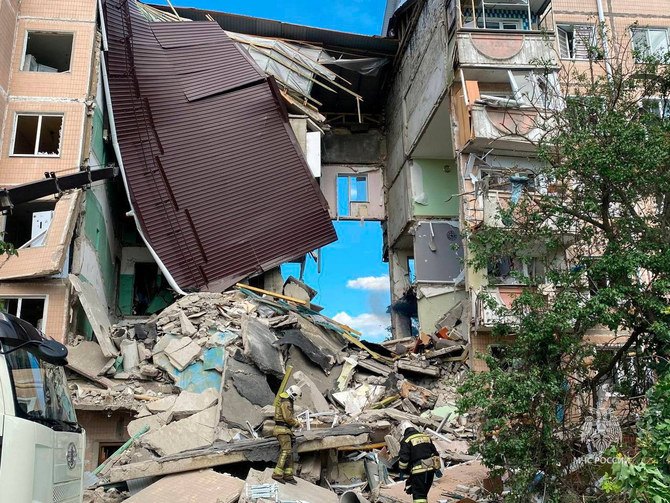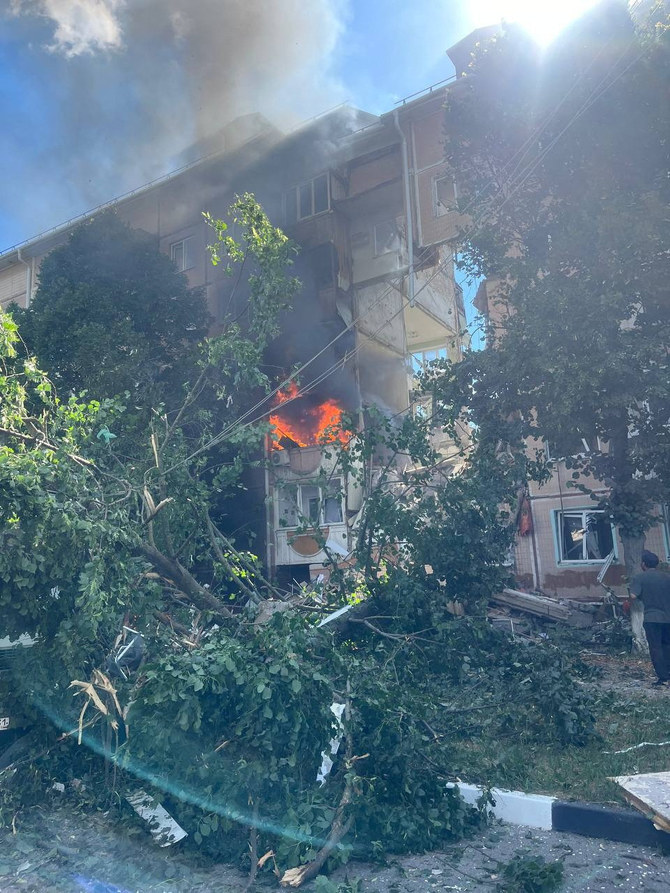KYIV: Ukrainian attacks on southern Russia’s Belgorod region killed six people on Friday, officials said.
Russia’s Emergencies Ministry said four bodies had been pulled from the rubble of a multi-floor apartment building hit by Ukrainian shelling in the border town of Shebekino.
A ministry statement posted after midnight said 50 percent of the rubble from the site had been cleared. Pictures on the ministry’s Telegram channel showed a crane clearing debris and the building’s facade shattered, with one stairwell collapsed.
Regional Governor Vyacheslav Gladkov said a Ukrainian drone had struck a car in a village near Shebekino, killing the driver. He said a woman was killed in her home when it was struck by rocket fire in the village of Oktyabrsky, further west.
Ukraine has staged frequent attacks on Belgorod and other Russian border regions in recent months.
President Vladimir Putin cited attacks on Belgorod as grounds for a cross-border incursion last month into Ukraine’s Kharkiv region.
The Russian military said its troops seized about a dozen settlements, while Ukrainian officials say the advance has been contained.
On the Ukrainian side of the border, military officials in Sumy region said a Russian air strike on Friday killed one person in the town of Shostka, about 45 km (28 miles) inside Ukrainian territory.
Towns and villages in Sumy region, west of Belgorod, are subject to daily Russian attacks.
Ukrainian attacks kill six in Russia’s Belgorod region, officials say
https://arab.news/wf2ud
Ukrainian attacks kill six in Russia’s Belgorod region, officials say

- On the Ukrainian side of the border, military officials in Sumy region said a Russian air strike on Friday killed one person in the town of Shostka
South Africa rescues all 260 miners stuck underground alive

- The miners were trapped underground on Thursday at the Kloof gold mine, 60 kilometers west of Johannesburg
- The gold mine is one of the deepest operated by the Johannesburg Stock Exchange-listed company
WESTONARIA, South Africa: Rescuers on Friday pulled out all 260 mine workers who had been stuck for more than 24 hours in an underground shaft in South Africa, the mine’s operator said.
The miners were trapped underground on Thursday at the Kloof gold mine, 60 kilometers (37 miles) west of Johannesburg, after a hoist used to access the shaft was damaged in an accident, the mining company Sibanye-Stillwater said.
The first phase of the rescue brought 79 people to the surface by 1:30 p.m. (1130 GMT) while the rest were rescued six hours later, it said in a statement.
“At no point was there any risk of injury to employees during the incident,” it said. A decision had been made against using the emergency escape routes which would have involved the miners walking longer distances, it added.
The gold mine is one of the deepest operated by the Johannesburg Stock Exchange-listed company.
Desperate relatives of the miners waited outside the site during the rescue efforts, most of them expressing shock at the incident, local television footage showed.
“All affected employees will also undergo thorough medical examinations, if required, while support has also been extended to employees’ families,” the mining company said.
The National Union of Mineworkers said the incident happened around 10:00 a.m. (0800 GMT) on Thursday. It expressed concern for the miners who had been “underground for almost 20 hours.”
Sibanye-Stillwater had said earlier that the miners would be brought to the surface around midday Friday.
“The employees are not trapped; it was decided to keep them at the sub-shaft station for now,” spokesperson Henrika Ninham said.
Mining employs hundreds of thousands of people in South Africa, which is the biggest exporter of platinum and a major exporter of gold, diamonds, coal and other raw materials. But accidents are common.
Dozens of mineworkers are killed each year, though the numbers have been falling as safety standards have been stepped up over the past two decades.
According to industry group Minerals Council South Africa, 42 miners died in 2024, compared to 55 the previous year.
Sibanye-Stillwater chief executive Neal Froneman said Friday they would not resume operations “until we are confident that all the necessary remedial actions have been implemented.”
All injured in stable condition after stabbing at Hamburg train station in Germany

- The Hamburger Abendblatt newspaper reported that two passersby managed to overpower the woman and take the knife from her
A 39-year-old woman, a German national, was arrested at the scene of Friday's attack without putting up resistance and police said they believe she acted alone.
The Hamburger Abendblatt newspaper reported that two passersby managed to overpower the woman and take the knife from her.
It quoted a fire department spokesman, Philipp Baumann, saying that the attack injured 18 people between the ages of 19 and 85. Three women aged 24, 52 and 85, and a 24-year-old man were critically injured. According to the police, however, all four were in stable condition on Saturday.
There was no immediate indication of any political motive, and police said that investigators were looking into whether the suspect may have been mentally ill.
The woman was expected to appear before a judge on Saturday and then placed in a psychiatric ward.
The attacker targeted people on the platform between tracks 13 and 14 in the station at around 6 p.m. Friday. The station in downtown Hamburg, Germany’s second-biggest city, is a major hub for local, regional and long-distance trains.
Carrying weapons, including knives, is banned at the station and on local transport in Hamburg.
African Union urges permanent ceasefire in Libya after clashes

- Libya is split between the UN-recognized government in Tripoli, led by Prime Minister Abdulhamid Dbeibah
- The clashes were sparked by the killing of an armed faction leader by a group aligned with Dbeibah’s government
ADIS ABABA: The African Union called for a permanent ceasefire in Libya on Saturday after deadly clashes in the capital earlier this month and demonstrations demanding the prime minister’s resignation.
The latest fighting in the conflict-torn North African country pitted an armed group aligned with the Tripoli-based government against factions it has sought to dismantle, resulting in at least eight dead, according to the United Nations.
Despite a lack of a formal ceasefire, the clashes mostly ended last week, with the Libya Defense Ministry saying this week that efforts toward a truce were “ongoing.”
On Saturday, the AU’s Peace and Security Council condemned the recent violence, calling for an “unconditional and permanent ceasefire.”
In a statement on X, the council urged “inclusive, Libyan-led reconciliation,” adding that it “appeals for no external interference.”
Libya is split between the UN-recognized government in Tripoli, led by Prime Minister Abdulhamid Dbeibah, and a rival administration in the east.
The country has remained deeply divided since the 2011 NATO-backed revolt that toppled and killed longtime leader Muammar Qaddafi.
The clashes were sparked by the killing of an armed faction leader by a group aligned with Dbeibah’s government — the 444 Brigade, which later fought a third group, the Radaa force that controls parts of eastern Tripoli and the city’s airport.
It came after Dbeibah announced a string of executive orders seeking to dismantle Radaa and dissolve other Tripoli-based armed groups but excluding the 444 Brigade.
Kingdom arrests 13,118 illegals in one week

RIYADH: Saudi authorities arrested 13,118 people in one week for breaching residency, work and border security regulations, the Saudi Press Agency reported on Saturday.
A total of 8,150 people were arrested for violations of residency laws, while 3,344 were held over illegal border crossing attempts, and a further 1,624 for labor-related issues.
The Ministry of Interior said that anyone found to be facilitating illegal entry to the Kingdom, including providing transportation and shelter, could face imprisonment for a maximum of 15 years, a fine of up to SR1 million ($267,000), as well as confiscation of vehicles and property.
Suspected violations can be reported on the toll-free number 911 in the Makkah and Riyadh regions, and 999 or 996 in other regions of the Kingdom.
South Lebanon votes in municipal elections that will test support for Hezbollah

- Municipal elections are taking place in Lebanon as residents in the south cast their votes over the weekend
- Hezbollah and Amal representatives are among those running for elections
BEIRUT: Residents of southern Lebanon voted Saturday in the country’s municipal elections that will test support for Hezbollah in the predominantly Shiite areas, months after the end of the destructive Israel-Hezbollah war.
Hezbollah is running in an alliance with the Amal group of Parliament Speaker Nabih Berri and both are expected to win mayoral races and the majority of seats in municipal councils. Both groups already won many municipalities uncontested.
South Lebanon is the fourth and last district to vote in the elections since May 4. Among those who voted Saturday were Hezbollah members wounded in the Sept. 17, 2024, explosions of thousands of pagers that blew up near-simultaneously in an operation carried out by Israel. More than a dozen were killed and nearly 3,000 wounded.
“The will of life is stronger than death and the will of construction is stronger than destruction,” President Joseph Aoun said during a tour of south Lebanon Saturday. He told reporters in his hometown of Aaichiyeh that he voted for the first time in 40 years.
Saturday’s vote came two days after Israel’s air force carried out intense airstrikes in different parts of south Lebanon.
Residents of villages and towns on the border with Israel, including the village of Kfar Kila that was almost completely destroyed during the war, cast their ballots at polling stations set up in the nearby city of Nabatiyeh. Residents of other border villages cast their ballots in the port city of Tyre.
“Southerners are proving again that they are with the choice of resistance,” Hezbollah legislator Ali Fayad, who represents border villages, said in Nabatiyeh.
Lebanon’s cash-strapped government has been scrambling to secure international funds for the war reconstruction, which the World Bank estimates at over $11 billion.
Hezbollah began firing rockets at Israel on Oct. 8, 2023, one day after a deadly Hamas-led incursion into southern Israel sparked the war in Gaza. Israel responded with shelling and airstrikes in Lebanon that escalated into a full-blown war that left more than 4,000 dead in Lebanon and more than 80 soldiers and 47 civilians in Israel. A US-brokered ceasefire went into effect in late November.





















